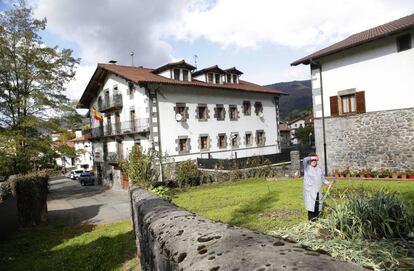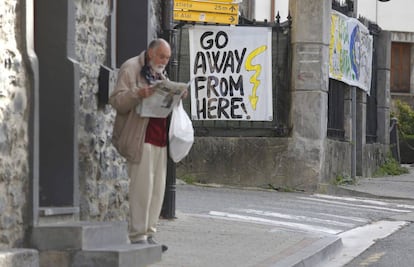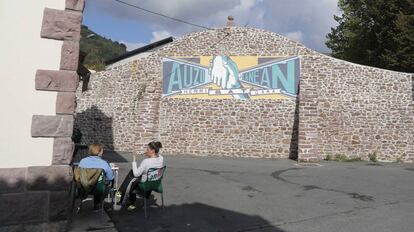Civil guards in northern Spain: “At least they’ve stopped trying to kill us”
Five years after ETA lay down its arms, force in Navarre still faces hostility from locals

The Civil Guard barracks in the small community of Alsasua, in Navarre region, where two members of the paramilitary police force and their girlfriends were attacked outside a local bar by a crowd of 50 people on October 15, is protected by a three-meter high metal fence. Spotlights and cameras provide further security for the compound, which includes accommodation for the officers serving there and their families.
The fence protecting the Civil Guard barracks in Elizondo, some 80 kilometers away, is even higher, and topped with razor wire. Behind, in the courtyard and garden, children’s toys lie strewn around. The impression is of some kind of settlement, a colony carved out of hostile territory.
The impression at the barracks is of some kind colony carved out of hostile territory
It’s the same image at the compound in Leiza, about 30 kilometers away, close to the border with the Basque Country, where officers do their tour of duty without their families.
“There’s no sense in bringing our wives and children. Life here is uncomfortable, very tense. So we see them every couple of months,” says an officer stationed in Leiza who doesn’t want to give his name. He’s been here for nine years, and while for the last five of them – following the ceasefire by the armed Basque independence group ETA – his life has not been in danger, he says daily life is far from normal. “What happened in Alsasua the other week could have happened to any of us in these villages,” he concludes.
ETA’s four-decade-long campaign of terror in pursuit of its goal of an independent Basque Country, which left almost 1,000 dead and thousands injured, ended on October 20, 2011. Along with the three Basque Country provinces of Guipúzcoa, Alava, and Vizcaya, ETA claimed Navarre as well. The province remains a stronghold of Basque nationalism.
Until the incident on October 15 in Alsasua, Navarre had been out of the news and seemed at peace. But talking to people in the small communities dotted throughout this largely rural region bordering France, a different picture emerges.

“Compared to 15 years ago, things are quiet,” says Francisco Moreno, who lives in Elizondo, a town that has been controlled by the left-leaning pro-independence coalitions, the latest incarnation of which is EH Bildu, for many years.
He says that the local Civil Guard officers are accepted in the community, and following a patrol through Elizondo, it’s clear that many local people are on friendly terms with them.
But the officers themselves prefer not to comment, saying that the balance of peace is fragile.
It is worth remembering that in 1995, pro-ETA youths stormed through Elizondo, attacking banks and shops, and hurling petrol bombs at Civil Guard officers. Over the years there have been attacks on the barracks using grenades. Officers’ cars have been attacked and letter bombs sent to the barracks.
Civil Guard officers do their tour of duty in Navarre without their families
A winding mountain road connects Elizondo with Leiza, a picturesque village used as a location in 2014’s smash hit comedy Eight Basque Surnames. It too is run by EH Bildu, and posters calling for independence for the Basque Country and for ETA prisoners to be moved to prisons in the region are pasted on its walls. There are also several demanding that the Civil Guard leave the village.
A Civil Guard officer who has been in Leiza since before ETA’s ceasefire opens the gate to the barracks, which is located on the outskirts of the village. “We hardly ever leave the compound: if we do it’s to do the shopping at an out-of-town supermarket; if we want to go to a bar, we visit another village. If you walk around here, you’ll be insulted. Everybody is hostile,” he says, asking not to be named.
In 2002, a Civil Guard officer was killed here when a booby-trapped placard calling for the Civil Guard to leave the village he was removing blew up. Another three men were injured.
There are 14 officers on duty at Leiza. None of them are from either the Basque Country or Navarre. “They say the situation here is normalizing. But compared to what?” asks one. He continues: “Compared to when ETA was around? Yes, obviously. At least they’ve stopped trying to kill us. But compare our day to an officer in Extremadura. We can’t even go out for dinner. There are people around here who approach us when nobody is looking and they apologize for not having said hello the previous week, but that there were other people around. People here are still afraid to talk to us, that’s why we can’t integrate. There’s nothing normal about this.”

None of the officers are surprised by what happened in Alsasua. “I wouldn’t dream of going out for a drink round here at night,” says one.
Spain's High Court has launched an investigation into the attack, saying it falls under Spanish terrorism legislation, and has called on the Civil Guard to prepare a report detailing harassment of its officers in the Basque Country and Navarre.
A local resident passing by the barracks in Leiza, who, like everybody else in the community will only talk on condition of anonymity, says that relations with the Civil Guard are at best distant. “Do they live a normal life? No way. They never go out. They keep a very low profile. They could get into trouble in some of the bars here. There are places they definitely couldn’t go into. They just wouldn’t. They’re not stupid. They wouldn’t try,” he says.
A stone’s throw from the barracks is the Taberna Torrea, a bar popular with supporters of an independent Basque Country that would include Navarre. Outside the bar, if you turn your head one way you can see the entrance to the barracks, with the Civil Guard’s motto above the gate: Todo por la patria (All for the fatherland). Look the other way and somebody has painted Euskal Presoal Etxera (Basque prisoners home) on a wall. But there’s an even more powerful symbol of the divide here: a placard outside the bar calls for the Civil Guard to leave Leiza, while a few meters away at the entrance to the barracks is a plaque in memory of Juan Carlos Beiro, the officer killed here when he tried to remove a similar, booby-trapped, placard.
English version by Nick Lyne.
Tu suscripción se está usando en otro dispositivo
¿Quieres añadir otro usuario a tu suscripción?
Si continúas leyendo en este dispositivo, no se podrá leer en el otro.
FlechaTu suscripción se está usando en otro dispositivo y solo puedes acceder a EL PAÍS desde un dispositivo a la vez.
Si quieres compartir tu cuenta, cambia tu suscripción a la modalidad Premium, así podrás añadir otro usuario. Cada uno accederá con su propia cuenta de email, lo que os permitirá personalizar vuestra experiencia en EL PAÍS.
¿Tienes una suscripción de empresa? Accede aquí para contratar más cuentas.
En el caso de no saber quién está usando tu cuenta, te recomendamos cambiar tu contraseña aquí.
Si decides continuar compartiendo tu cuenta, este mensaje se mostrará en tu dispositivo y en el de la otra persona que está usando tu cuenta de forma indefinida, afectando a tu experiencia de lectura. Puedes consultar aquí los términos y condiciones de la suscripción digital.








































